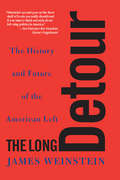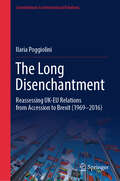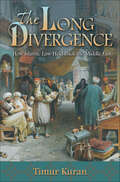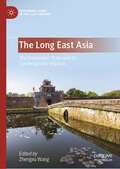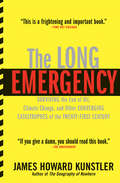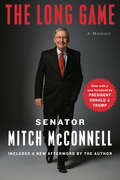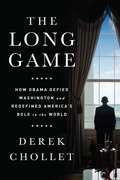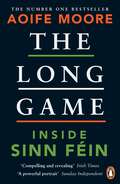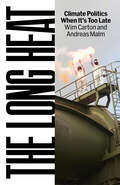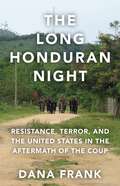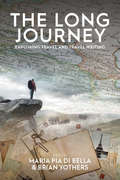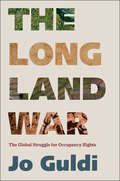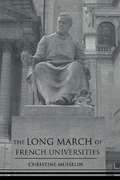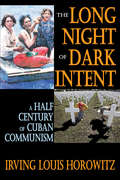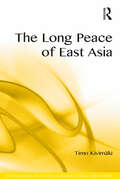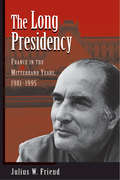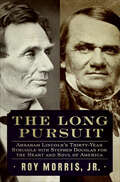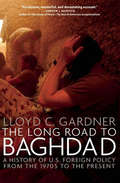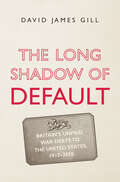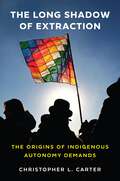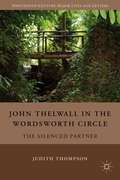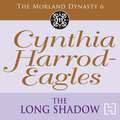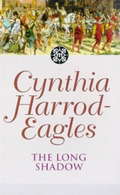- Table View
- List View
The Long Detour: The History And Future Of The American Left
by James WeinsteinThe Long Detour is an intellectually engaging overview of the history of socialism in the United States and of the continuing relevance of socialist principles today. Historian and journalist James Weinstein, a lifelong socialist and one-time Communist, takes readers from the movement's early years of utopian communities, through the heyday of engagement with the makers of corporate America, and into the future of a de-industrializing era. He contends that socialism as a political movement was sidetracked when Communist domination of the American left stifled creative social thought and diverted the traditional left into sterile disputes over the true nature of the Soviet Union. And he argues that while "real existing socialism" - which is what the Soviets called their system - is dead, the humane social principles articulated by Marx and the leaders of the pre-1917 socialist movement remain vitally important to those on the left who seek to realize the promise of American democracy.
The Long Disenchantment: Reassessing UK-EU Relations from Accession to Brexit (1969–2016) (Contributions to International Relations)
by Ilaria PoggioliniThis book seeks to replace a comforting European narrative of British missed opportunities with a chronicle of the complexity of UK/EC-EU relations. After nearly a decade of Brexit (2016), it revisits the historical evolution of the relationship between Britain and Europe since the 1970s. Building on an in-depth study of primary and secondary sources, the author sheds new light on the intricacies of that relationship. The book is structured in six chapters, the first of which reflects on the causes of the UK's lack of engagement in the early and crucial developments of the European Community. The second chapter revisits ten years of stop-go diplomacy of accession, and the meaning of the first enlargement for Britain and its partners. The third chapter argues that in the early years, entry represented for Britain an opportunity to deliver change, working with France and Germany inside the EC; and, as an EC member, building new relationships with countries outside, including in the Commonwealth. The fourth chapter focuses on the dawning realisation that EC membership meant for Britain joining its partners on a journey towards an unknown destination in search of whatever-closer Union would mean. The Fifth chapter concentrates on the 1980s, when, on the one hand, the British government was to the fore in the creation of a single market; while on the other it openly challenged an agreed-upon narrative, among the continental member states. This narrative was one which sought to reshape European values and relationships, together with its culture, geography and history, round a commitment to greater integration. The final chapter is an epilogue that examines the political decisions of the last four British prime ministers: Major, Brown, Blair and Cameron, in confronting and reacting to the reality of European Union, from the Maastricht Treaty (1992) onward. This examination suggests that, rather than political continuity, discontinuity, led the UK, through Prime Minister David Cameron's efforts at renegotiation in the EU, to Brexit, and his instant resignation. This book invites readers to rethink, refine, and challenge the dominant narrative of Britain as a predictable, permanent outsider condemned to irrelevance in the EC/EU. It will appeal to scholars of international relations and political history, as well as political decision-makers, both in Britain and the EU.
The Long Divergence: How Islamic Law Held Back the Middle East
by Timur KuranHow religious barriers stalled capitalism in the Middle EastIn the year 1000, the economy of the Middle East was at least as advanced as that of Europe. But by 1800, the region had fallen dramatically behind—in living standards, technology, and economic institutions. In short, the Middle East had failed to modernize economically as the West surged ahead. What caused this long divergence? And why does the Middle East remain drastically underdeveloped compared to the West? In The Long Divergence, one of the world's leading experts on Islamic economic institutions and the economy of the Middle East provides a new answer to these long-debated questions.Timur Kuran argues that what slowed the economic development of the Middle East was not colonialism or geography, still less Muslim attitudes or some incompatibility between Islam and capitalism. Rather, starting around the tenth century, Islamic legal institutions, which had benefitted the Middle Eastern economy in the early centuries of Islam, began to act as a drag on development by slowing or blocking the emergence of central features of modern economic life—including private capital accumulation, corporations, large-scale production, and impersonal exchange. By the nineteenth century, modern economic institutions began to be transplanted to the Middle East, but its economy has not caught up. And there is no quick fix today. Low trust, rampant corruption, and weak civil societies—all characteristic of the region's economies today and all legacies of its economic history—will take generations to overcome.The Long Divergence opens up a frank and honest debate on a crucial issue that even some of the most ardent secularists in the Muslim world have hesitated to discuss.
The Long East Asia: The Premodern State and Its Contemporary Impacts (Governing China in the 21st Century)
by Zhengxu WangThis book brings together a range of studies that aim at illustrating the ideas, institutions, historical patterns, and contemporary relevance of the social-political system that existed in the main part of East Asia during the premodern era. This is most often known as the Confucian literati-bureaucratic state, the imperial Chinese bureaucratic state, or the Confucian-Legalist state, that was established and endured most notably in China, but also in several East Asian societies such as Korea, Vietnam, Japan. That state and sociopolitical system also greatly shaped state making in several kingdoms in the region – such as Ryukyu and Dali – which were later merged into larger polities. Illuminating the significance of these historical patterns for today, this book will interest political scientists, historians, philosophers, and the general public.
The Long Emergency: Surviving the End of Oil, Climate Change, and Other Converging Catastrophes of the Twenty-First Century
by James Howard KunstlerA controversial hit that sparked debate among businessmen, environmentalists, and bloggers, The Long Emergency by James Howard Kunstler is an eye-opening look at the unprecedented challenges we face in the years ahead, as oil runs out and the global systems built on it are forced to change radically.
The Long Game: A Memoir
by Mitch McconnellIn October 1984, a hard-charging Kentucky politician waited excitedly for President Ronald Reagan to arrive at a presidential rally in Louisville. In the midst of a tough Senate campaign against an incumbent Democrat, the young Republican hoped Reagan's endorsement would give a much-needed boost to his insurgent campaign. He even had a camera crew ready to capture the president's words for a TV commercial he planned to air during the campaign's final stretch. Alas, when Reagan finally stepped to the microphone, he smiled for the crowd and declared: "I'm happy to be here with my good friend, Mitch O'Donnell." That was hardly Mitch McConnell's first setback, and far from his last. But as he learned when running his very first campaign for student body president in high school, you don't have to be the most popular, the most athletic, or even the luckiest kid to win. You just need to run the best campaign. So he swallowed hard, put his head down, and kept going. Four weeks later, in the biggest upset of the year, his dream of being a US senator came true--by a margin of about one vote per precinct. By persevering, he'd be the only Republican in the country to beat an incumbent Democratic US senator. McConnell learned patience and fortitude during his post-World War II youth in Alabama. His mother helped him beat polio by leading him through long, aching exercises every day for two years. His father taught him the importance of standing up to bullies, even if it meant taking the occasional punch. It turned out to be the perfect childhood for a future Senate majority leader. "In the line of work I would choose, compromise is key, but I'd come to find that certain times required me to invoke the fighting spirit both of my parents instilled in me." The Long Game is the candid, behind-the-scenes memoir of a man famous for his discretion. For more than three decades, McConnell has worked steadily to advance conservative values, including limited government, individual liberty, fiscal prudence, and a strong national defense. But he has always cared much more about moving the ball forward than about who gets the credit.Even in recent years, when some of his colleagues seem obsessed with maintaining and cultivating their images in a twenty-four-hour news cycle, McConnell focuses on how today's controversies will affect the country in a year, or two, or ten. Now McConnell reveals what he really thinks about the rivalry between the Senate and the House; the players and the stakes involved when a group of political opportunists tried to hijack the Tea Party movement; and key figures such as Barack Obama, Joe Biden, and Harry Reid. He tells the inside story of the battle against Obamacare and other fights to protect the US Constitution against further encroachment by an out-of-control White House that's stuck in a permanent campaign. He explains the real causes of the chronic gridlock that has so many voters enraged, his ongoing efforts to restore the US Senate's indispensable dual role as a brake on excess and a tool for national consensus, and what ordinary citizens have a right to expect from Washington. In today's atmosphere of impatience and instant gratification, McConnell still believes the Founders knew best when they instituted a government with checks and balances. As he writes, "In the end, the goal isn't a perfectly running congressional machine or a party without blemish or inner turmoil. The goal is to allow the country to work out its differences freely and energetically, confident that the institutions the Founders left us are capable of accommodating the disputes and disagreements that arise in a nation as big and diverse and open as ours."From the Hardcover edition.
The Long Game: How Obama Defied Washington and Redefined America's Role in the World
by Derek CholletAuthoritative and original, The Long Game is a controversial assessment of President Obama's foreign policy legacy. Too often, critical discussions concerning American foreign policy are divorced from the political reality in which leaders face choices and make decisions. Here, consummate White House insider Derek Chollet corrects common misperceptions to show how President Obama has done more to alter American foreign policy than any Democratic president since Kennedy. Ten years after 9/11 and three years into his presidency, President Obama was ready to shelve the wars in Afghanistan and Iraq, and shift his foreign-policy focus to bolstering the power of America's presence in the international community. his foreign-policy strategy was to be founded on economic strength and global authority-but history intruded. Instead, in the coming years, Syria disintegrated; ISIS emerged; Egypt, Ukraine, and post-Qaddafi Libya erupted. Russia has resurfaced as a military threat to Europe, and America has inexorably declined. The world order today is as complicated as it was at the end of the Cold War. President Obama is not to blame.With new and surprising insights, Derek Chollet reveals that Obama has largely remained true to the policies he outlined before taking office: extracting US forces from Iraq and Afghanistan; deemphasizing military force as the primary tool of American power; rebalancing toward Asia; involving Congress into decisions about the use of force; and pursuing bold policy goals on issues like climate change, trade, and nuclear disarmament. Ultimately, Obama's policies at home and abroad have been restoring American power, not squandering it. And by redefining American foreign policy, Obama has defied official Washington. The Long Game boldly sums up the core tenets and names Obama's highly successful doctrine: to position the US to win "the long game.”
The Long Game: Inside Sinn Féin
by Aoife MooreInside the rise of the political party, once subordinate to the IRA, that is on the brink of taking power in Ireland Sinn Féin, long widely-regarded as the political wing of the Provisional IRA, is the most popular political party in both Northern Ireland and the Republic. A movement once synonymous with a paramilitary campaign is on the brink of taking real power through purely democratic means. But if Sinn Féin has mastered the art of electoral politics, it remains strangely opaque. Who really runs the party? How is it funded? And what can we expect of it as a party of government?Aoife Moore, Irish Journalist of the Year 2021. explores these and other burning questions in The Long Game. Drawing on exclusive interviews with current and former members of Sinn Féin, she builds up a picture of a party undergoing a profound, and still incomplete, transformation. She looks at the key individuals and moments that put the party on its present course, and she explores tensions within the party and the wider republican movement.Packed with revelatory details, The Long Game is a groundbreaking telling of contemporary Ireland's biggest and most elusive political story.
The Long Goodbye: Memories Of My Father
by Patti DavisRonald Reagan's daughter writes with a moving openness about losing her father to Alzheimer's disease. The simplicity with which she reveals the intensity, the rush, the flow of her feelings encompasses all the surprises and complexities that ambush us when death gradually, unstoppably invades life.In The Long Goodbye, Patti Davis describes losing her father to Alzheimer's disease, saying goodbye in stages, helpless against the onslaught of a disease that steals what is most precious-a person's memory. "Alzheimer's," she writes, "snips away at the threads, a slow unraveling, a steady retreat; as a witness all you can do is watch, cry, and whisper a soft stream of goodbyes."She writes of needing to be reunited at forty-two with her mother ("she had wept as much as I over our long, embittered war"), of regaining what they had spent decades demolishing; a truce was necessary to bring together a splintered family, a few weeks before her father released his letter telling the country and the world of his illness . . .The author delves into her memories to touch her father again, to hear his voice, to keep alive the years she had with him.She writes as if past and present were coming together, of her memories as a child, holding her father's hand, and as a young woman whose hand is being given away in marriage by her father . . . of her father teaching her to ride a bicycle, of the moment when he let her go and she went off on her own . . . of his teaching her the difference between a hawk and a buzzard . . . of the family summer vacations at a rented beach house-each of them tan, her father looking like the athlete he was, with a swimmer's broad shoulders and lean torso. . . . She writes of how her father never resisted solitude, in fact was born for it, of that strange reserve that made people reach for him. . . . She recalls him sitting at his desk, writing, staring out the window . . . and she writes about the toll of the disease itself, the look in her father's eyes, and her efforts to reel him back to her. Moving . . . honest . . . an illuminating portrait of grief, of a man, a disease, and a woman and her father.From the Hardcover edition.
The Long Heat: Climate Politics When It’s Too Late
by Andreas Malm Wim CartonA scathing critique of proposals to geoengineer our way out of climate disaster, by the bestselling authors of OvershootThe world is crossing the 1.5°C global warming limit, perhaps exceeding 2°C soon after. What is to be done when these boundaries, set by the Paris Agreement, have been passed? In the overshoot era, schemes proliferate for muscular adaptation or for new technologies to turn the heat down at a later date by removing CO2 from the air or blocking sunlight. Such technologies are by no means safe; they come with immense risks and provide an excuse for those who would prefer to avoid limiting emissions in the present. But do they also hold out some potential? Can the catastrophe be reversed, masked or simply adapted to once it is a fact? Or will any such roundabout measures simply make things worse?The Long Heat maps the new front lines in the struggle for a liveable planet and insists on the climate revolution long overdue. In the end, no technology can absolve us of responsibility for our planet and each other.
The Long Honduran Night: Resistance, Terror, and the United States in the Aftermath of the Coup
by Dana FrankShortlisted for the 2019 Juan E. Méndez Book Award for Human Rights in Latin America, this powerful narrative recounts the dramatic years in Honduras following the June 2009 military coup that deposed President Manuel Zelaya, told in part through first-person experiences, layered into deeper political analysis. It weaves together two broad pictures: first, the repressive regime that was launched with the coup, and the ways in which U.S. policy has continued to support that regime; and second, the brave and evolving Honduran resistance movement, with aid from a new solidarity movement in the United States.
The Long Journey: Exploring Travel and Travel Writing
by Maria Pia Di Bella and Brian YothersTravel writing has, for centuries, composed an essential historical record and wide-ranging literary form, reflecting the rich diversity of travel as a social and cultural practice, metaphorical process, and driver of globalization. This interdisciplinary volume brings together anthropologists, literary scholars, social historians, and other scholars to illuminate travel writing in all its forms. With studies ranging from colonial adventurism to the legacies of the Holocaust, The Long Journey offers a unique dual focus on experience and genre as it applies to three key realms: memory and trauma, confrontations with the Other, and the cultivation of cultural perspective.
The Long Land War: The Global Struggle for Occupancy Rights (Yale Agrarian Studies Series)
by Jo GuldiA definitive history of ideas about land redistribution, allied political movements, and their varied consequences around the world &“An epic work of breathtaking scope and moral power, The Long Land War offers the definitive account of the rise and fall of land rights around the world over the last 150 years.&” —Matthew Desmond, Pulitzer Prize–winning author of Evicted: Poverty and Profit in the American City Jo Guldi tells the story of a global struggle to bring food, water, and shelter to all. Land is shown to be a central motor of politics in the twentieth century: the basis of movements for giving reparations to formerly colonized people, protests to limit the rent paid by urban tenants, intellectual battles among development analysts, and the capture of land by squatters taking matters into their own hands. The book describes the results of state-engineered &“land reform&” policies beginning in Ireland in 1881 until U.S.-led interests and the World Bank effectively killed them off in 1974. The Long Land War provides a definitive narrative of land redistribution alongside an unflinching critique of its failures, set against the background of the rise and fall of nationalism, communism, internationalism, information technology, and free-market economics. In considering how we could make the earth livable for all, she works out the important relationship between property ownership and justice on a changing planet.
The Long March of French Universities
by Christine MusselinThe main point of this book is to argue that French universities experienced a quiet but important change during the last decade, which allowed them to become pertinent and more autonomous actors within the French university system.
The Long Night of Dark Intent: A Half Century of Cuban Communism
by Irving HorowitzThe Cuban Revolution of 1959 was a benchmark of triumph and a harbinger of tragedy to come. Rather than herald a new era of Cuba joining the world community of nations as a paragon of democracy as many fervently hoped and believed it would, it became instead a new stage in authoritarian rule in the Western hemisphere.For more than a half century since then Cuba has been defined by the capacity of a single family to command and determine the fate of a nation and to do so with a minimum of opposition. Incredibly, even those professing adhesion to democratic norms have been ready to forgive the dictator his excesses. This volume explains the theory and practice of this absence of internal opposition and the persistence of external support for the Castro family and its entourage.The Long Night of Dark Intent is chronological in order, with the author indicating major points in each of the five decades covered. The volume covers five centers of system analysis: economics, politics, society, military, and ideology. Who or what "determines" events and decisions is the stuff of real history. It is precisely due to variability in causal chains in society that we have huge variance in levels of predictability. The course of the Cuban Revolution gives strong support for such an approach to the Castro Era. This is a unique, unflinching account with a strong emphasis on the importance of U.S. policy decisions over time.
The Long Peace of East Asia (Rethinking Asia and International Relations)
by Timo KivimäkiThe annual number of battle deaths from interstate and intra-state conflicts in East Asia has declined by 95% since 1979. During the past three decades, East Asia has been more peaceful than Europe, the Americas or any continent, in terms of battle deaths per capita. When generating theories on peace and war, studies almost never look at the experiences of East Asia. Yet the region by focusing on a commitment to development, is a social reality that is less paranoid, less militaristic and more cooperative. Since 1979 there has been a commonly accepted rule to keep domestic issues domestic so that external military interference, that often caused the majority of battle deaths, was not needed. Thus the emergence of the long peace of East Asia is historically specific, and cannot be generalized by studying objective, material conditions independent of common perceptions and common interpretations. This does not mean that the East Asian experience is not relevant for other regions in the world, but that generalizations should not be attempted to be drawn from the material conditions, but rather from the lived experience and socially constructed realities of East Asia. Since East Asia is a spectacular case of pacification, and since it has not contributed much to our theories of peace and conflict, The Long Peace of East Asia is an important book for studies on peace and war.
The Long Presidency: France In The Mitterrand Years, 1981-1995
by Julius W Friend"A balanced, yet critical, review of Mitterrand's fourteen-year presidency. Friend has crowned a long career as an expert on French politics with this astute analysis and assessment of a decisive chapter in the history of French Socialism. This is contemporary history at its best." —Richard Kuisel SUNY, Stony Brook "An intelligent and highly readable account of the Mitterrand years that, Friend argues, have changed the political landscape of France. ... A very good example of instant history" —Fritz Stern Foreign Affairs In this informed and balanced treatment of recent French history, Julius Friend analyzes the changes, successes, and failures in the long and checkered record of the former French president, Francois Mitterrand. Extensive interviews with French politicians and intellectuals complement his original research. Mitterrand was in office longer than any other democratic president, but Friend asks lis to consider the legacy of such a term. Elected in 1981 on a platform of radical reorganization of the French economy and society, Mitterrand was compelled to change policy within two years. Conventional austerity replaced socialist measures, and his second term was spotted by scandal and weakened by illness. The Mitterrand era saw the end of French hopes to be first among equals in Western Europe; instead, Mitterrand inaugurated a partnership with unified Germany in the European Union.
The Long Pursuit: Abraham Lincoln's Thirty-Year Struggle with Stephen Douglas for the Heart and Soul of America
by Roy Morris Jr.A study of the rivalry between two American politicians and how it transformed them & the nation they sought to lead in the dark days before the Civil War.“This intimate dual portrait of Abe Lincoln and Stephen Douglas as young men . . . is a delight to read and a revealing journey through a mid-nineteenth-century America careening toward disaster.” —Kenneth Ackerman, author Young J. Edgar and Boss TweedFor the better part of two decades, Stephen Douglas was the most famous and controversial politician in the United States, a veritable “steam engine in britches.” Abraham Lincoln was merely Douglas’s most persistent rival within their adopted home state of Illinois, known mainly for his droll sense of humor, bad jokes, and slightly nutty wife.But from the time they first set foot in the Prairie State in the early 1830s, Lincoln and Douglas were fated to be political competitors. The Long Pursuit tells the dramatic story of how these two radically different individuals rose to the top rung of American politics, and how their personal rivalry shaped and altered the future of the nation during its most convulsive era. Indeed, had it not been for Douglas, who served as Lincoln’s personal goad, pace horse, and measuring stick, there would have been no Lincoln-Douglas debates in 1858, no Lincoln presidency in 1860, and perhaps no Civil War six months later. For both men—and for the nation itself—the stakes were that high.Not merely a detailed political study, The Long Pursuit is also a compelling look at the personal side of politics on the rough-and-tumble western frontier. It shows us a more human Lincoln, a bare-knuckles politician who was not above trading on his wildly inaccurate image as a humble “rail-splitter,” when he was, in fact, one of the nation’s most successful railroad attorneys. And as the first extensive biographical study of Stephen Douglas in more than three decades, the book presents a long-overdue reassessment of one of the nineteenth century’s more compelling and ultimately tragic figures, the one-time “Little Giant” of American politics.“With deft writing and prudent judgments, Morris captures [Douglas’s and Lincoln’s] burning ambition, political skills, and deeply held beliefs amid the turbulence of a country’s unfolding tragedy.” —Jeffry D. Wert, author of The Sword of Lincoln
The Long Road to Baghdad: A History of U.S. Foreign Policy from the 1970s to the Present
by Lloyd C. GardnerThe diplomatic historian examines the ideas, policies and actions that led from Vietnam to the Iraq War and America&’s disastrous role in the Middle East. &“What will stand out one day is not George W. Bush&’s uniqueness but the continuum from the Carter doctrine to &‘shock and awe&’ in 2003.&” —from The Long Road to Baghdad In this revealing narrative of America&’s path to its &“new longest war,&” one of the nation&’s premier diplomatic historians excavates the deep historical roots of the US misadventure in Iraq. Lloyd Gardner&’s sweeping and authoritative narrative places the Iraq War in the context of US foreign policy since Vietnam, casting the conflict as a chapter in a much broader story—in sharp contrast to the dominant narrative, which focus almost exclusively on the actions of the Bush Administration in the months leading up to the invasion. Gardner illuminates a vital historical thread connecting Walt Whitman Rostow&’s defense of US intervention in Southeast Asia, Zbigniew Brzezinski&’s attempts to project American power into the &“arc of crisis&” (with Iran at its center), and the efforts of two Bush administrations, in separate Iraq wars, to establish a &“landing zone&” in that critically important region. Far more disturbing than a simple conspiracy to secure oil, Gardner&’s account explains the Iraq War as the necessary outcome of a half-century of doomed US policies. &“A vital primer to the slow-motion conflagration of American foreign policy.&” —Kirkus Reviews
The Long Shadow of 9/11
by Brian Michael Jenkins John Paul GodgesThis book provides an array of answers to the question, In the ten years since the 9/11 attacks, how has America responded? In a series of essays, RAND authors lend a farsighted perspective to the national dialogue on 9/11's legacy; assess the military, political, fiscal, social, cultural, psychological, and moral implications of U.S. policymaking since 9/11; and suggest options for effectively dealing with the terrorist threat in the future.
The Long Shadow of Default: Britain's Unpaid War Debts to the United States, 1917-2020
by David James GillRethinking the causes and consequences of Britain&’s default on its First World War debts to the United States of AmericaThe Long Shadow of Default focuses on an important but neglected example of sovereign default between two of the wealthiest and most powerful democracies in modern history. The United Kingdom accrued considerable financial debts to the United States during and immediately after the First World War. In 1934, the British government unilaterally suspended payment on these debts. This book examines why the United Kingdom was one of the last major powers to default on its war debts to the United States and how these outstanding obligations affected political and economic relations between both governments. The British government&’s unpaid debts cast a surprisingly long shadow over policymaking on both sides of the Atlantic. Memories of British default would limit transatlantic cooperation before and after the Second World War, inform Congressional debates about the economic difficulties of the 1970s, and generate legal challenges for both governments up until the 1990s. More than a century later, the United Kingdom&’s war debts to the United States remain unpaid and outstanding. David James Gill provides one of the most detailed historical analyses of any sovereign default. He brings attention to an often-neglected episode in international history to inform, refine, and sometimes challenge the wider study of sovereign default.
The Long Shadow of Extraction: The Origins of Indigenous Autonomy Demands
by Christopher L. CarterHow resistance to extraction shaped Indigenous demands for autonomy, integration, or assimilationFrom the onset of colonialism, Indigenous communities have faced seizure of their land, labor, and resources by non-Indigenous actors. In The Long Shadow of Extraction, Christopher Carter argues that the native groups&’ resistance to extraction took distinct forms, and that this variation explains why some communities demanded autonomy while others demanded integration or assimilation. Countering existing scholarship that assumes a universal demand for autonomy, Carter shows that some Indigenous communities in fact refused government offers to recognize their local political authority and longstanding economic institutions.Carter argues that contemporary Indigenous demands were forged in early twentieth-century efforts to resist extraction. Drawing on two emblematic Latin American cases, Peru and Bolivia, Carter shows that in communities where traditional Indigenous leaders organized resistance, ethnic mobilization occurred and gave rise to enduring demands for autonomy, or state recognition of Indigenous identities and institutions. In communities where unions and leftist parties organized resistance, class-based mobilization became the norm. This led communities to reject autonomy and demand instead integration (state recognition of Indigenous identities but not Indigenous institutions) or assimilation (state recognition of neither Indigenous identities nor institutions). Carter&’s groundbreaking account of Indigenous resistance has important implications for understanding not only the historical emergence of autonomy but variations in identity-based mobilization in multiethnic democracies.
The Long Shadow of the British Empire: The Ongoing Legacies Of Race And Class In Zambia
by Juliette Bridgette Milner-ThorntonThis book explores the lived experiences of formerly colonized people in the privacy of their homes, communities, workplaces, and classrooms, and the associations created from these social interactions. It examines the centrality of gender and social identity in the formation of non-western people in the British Empire.
The Long Shadow: The Morland Dynasty, Book 6 (Morland Dynasty #6)
by Cynthia Harrod-Eagles1670: King Charles II's reign has brought peace and prosperity to the Morland family, but James II's ascent to the throne will shatter their restored fortunes.In Yorkshire, Morland Place has flourished during the Restoration, and in London the beautiful and sprited Annunciata, is now Countess of Chelmsford, a wealthy and well-connected woman, intimate with the Royal Family.But storm clouds gather over them all when the reign of James II brings rebellion and discord. Trouble is never far from Annunciata in these turbulent times. Jealousy, betrayal and violent death threaten her children, and for Annunciata herself comes the anguish of love lived in the long shadow of secrecy, a love that can only lead to tragedy.
The Long Shadow: The Morland Dynasty, Book 6 (Morland Dynasty #6)
by Cynthia Harrod-Eagles1670: King Charles II's reign has brought peace and prosperity to the Morland family, but James II's ascent to the throne will shatter their restored fortunes.In Yorkshire, Morland Place has flourished during the Restoration, and in London the beautiful and sprited Annunciata, is now Countess of Chelmsford, a wealthy and well-connected woman, intimate with the Royal Family. But storm clouds gather over them all when the reign of James II brings rebellion and discord. Trouble is never far from Annunciata in these turbulent times. Jealousy, betrayal and violent death threaten her children, and for Annunciata herself comes the anguish of love lived in the long shadow of secrecy, a love that can only lead to tragedy.
